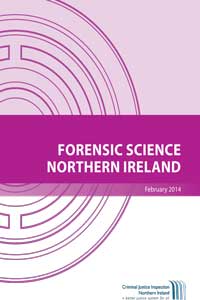Forensic Science Northern Ireland
Publication: 13/02/14

'Forensic services require crime scene to court approach' say Inspectors
An independent inspection report by Criminal Justice Inspection Northern Ireland (CJI) has called for the criminal justice system to develop a more joined-up approach to forensic services to meet current and future forensic requirements.
The inspection of Forensic Science Northern Ireland (FSNI) looked at progress made within the organisation since it was last inspected in 2009.
"This inspection found the quality of the scientific analysis and reporting being provided by FSNI was good. The organisation has successfully retained external accreditation for its services from UKAS and criminal justice system customers of FSNI were also satisfied with the standard of advice and reports being provided," explained Deputy Chief Inspector James Corrigan.
"These positive developments along with the commitment of £15m by the Department of Justice to fund new laboratory accommodation, are however being undermined by backlogs and delays in the production of reports that are occurring as FSNI struggles to meet demand for its services," he said.
To deal with this issue, Inspectors have recommended the development of a strategy to support the provision of a seamless service which addresses the funding and delivery of forensic services from crime scene to court.
"The strategy would require the input of the Police Service of Northern Ireland (PSNI) and FSNI as the key providers of forensic services and should be directly linked to the requirements of prosecutors and the needs of the courts," said Mr Corrigan.
In addition it would contribute to a reduction in avoidable delay and the achievement of justice sector objectives such as faster, fairer justice.
The Deputy Chief Inspector added that the police and FSNI should work together to better manage the demand for forensic science expertise and improve productivity within the laboratory.
"Inspectors welcome the steps that have been taken to date within FSNI to improve efficiency and the 20% increase in capacity already achieved in relation to some drugs analysis and exhibits submitted by the State Pathologist's Department.
"This level of increased productivity needs to be urgently replicated within other specialisms operating within the organisation in order to reduce avoidable delay and minimise criticism that has recently been raised in court.
"We would also support FSNI's efforts to make better use of staff overtime by using it in a targeted manner to address backlogs and spikes in demand for forensic science and maximise value for money," said Mr Corrigan.
In conclusion, the Deputy Chief Inspector indicated that in order to strengthen the quality of forensic science in Northern Ireland, Inspectors recommended FSNI should seek to allocate a proportion of budgetary savings to research and development.